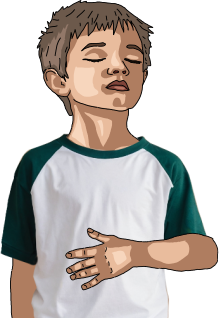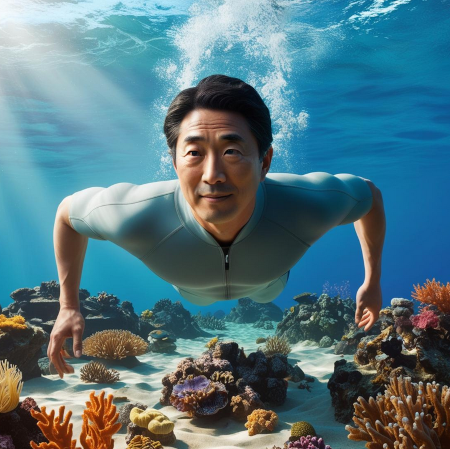P1W9: Clean Air
back |
Take a deep breath. Really fill up your lungs and visualise all that fresh air rushing in. Nice, right? Now try it again, but this time, put your hand on your stomach. Do you feel it moving? That’s your body filling up with the air it needs. Studies suggest that people who breathe slowly and deeply tend to live longer. So, if you want to live a long life, strive to breathe slowly most of the time. |
But why do we actually need air all the time? Could we live without it, like we can without food or water?
Now, are you ready for a little challenging activity? Take a deep breath, hold it, and see how long you can go without breathing. Count the seconds, and stop if it gets too hard.
How long did you make it? A minute? Maybe a little less? Most people can’t last more than one minute without taking another breath. Why is that? Because we need air constantly—not every few hours, not once a day, but every single moment. We can last weeks without food, days without water, but without air, we wouldn’t last more than 4 minutes.
| Some exceptional people, the traditional pearl divers, can hold their breath for up to ten minutes. Found in places like Japan, these divers have trained their bodies to dive deep without oxygen, slowing their heart rate and conserving every bit of air. Their skill, passed down through generations, shows just how adaptable the human body can be—even in the depths of the ocean. However, most of us are not pearl divers. |  |
This is why holding our breath for too long feels… intense. But it’s not just “air” in general that we need. It’s one special part of it.
Air is more than one thing, and funny enough, we use only a small part of it, the oxygen. It’s actually made of different gases mixed together, each with its own job. Let’s break it down:

So, while we call it “air,” we’re actually after the oxygen part. Oxygen is like fuel for our bodies—it goes into our lungs, enters our blood, and travels to every single cell. Without it, our cells couldn’t create energy, and without energy… well, we wouldn’t be here to talk about it!
What happens after we breathe in that treasured oxygen? Once it goes into our blood and reaches all the cells in our body, it’s used up, creating a waste gas called carbon dioxide. So, when we breathe out, we’re not getting rid of air, we’re getting rid of the carbon dioxide we don’t need.
This is how we keep the oxygen moving through our bodies while getting rid of what we don’t need. Oxygen in, carbon dioxide out—it’s like our own personal recycling system.
